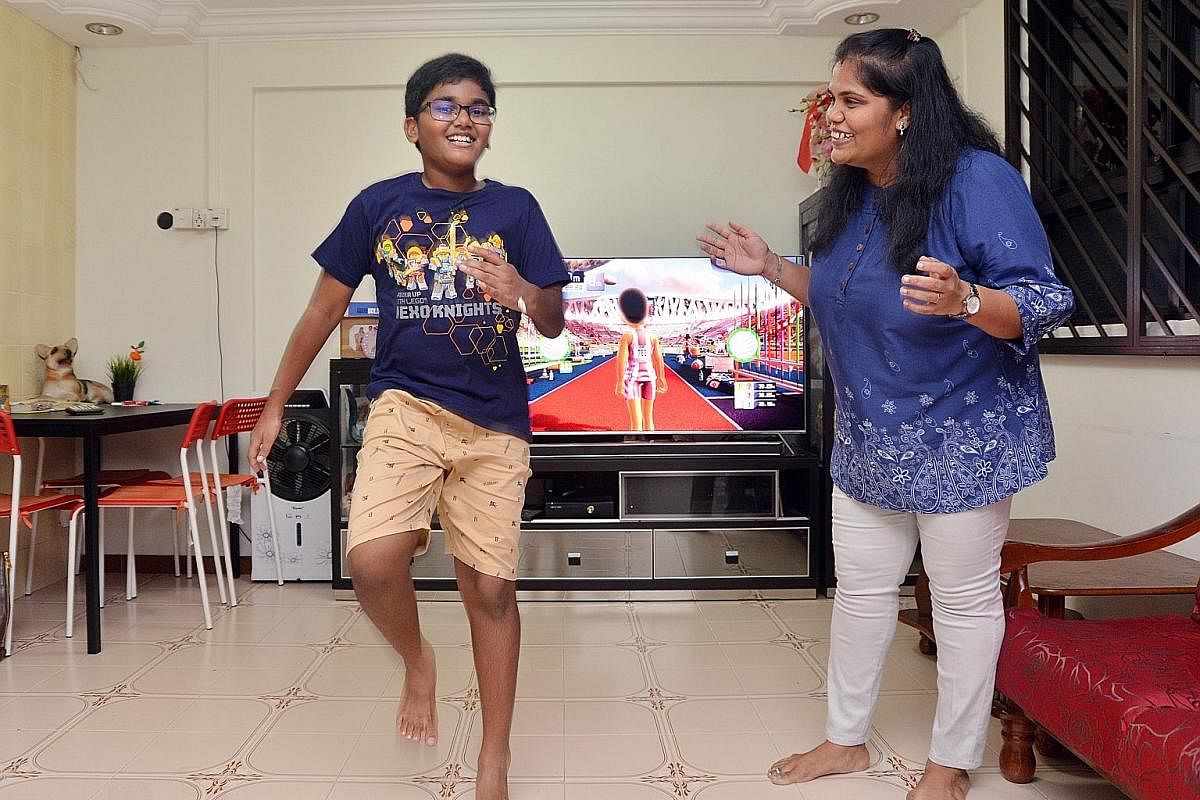How to help overweight kids: Emphasise health over weight
Families should focus on healthy living instead of weight issues when guiding children who have higher BMIs than their peers


Accountant Wendy Wong was surprised to learn from a Health Promotion Board (HPB) phone call last year that her preschool daughter Tan Yan Jie was severely overweight.
"I just felt that she was fleshier and bigger than her classmates. I didn't realise she was overweight," says Ms Wong, 41.
The proportion of overweight and severely overweight children in mainstream schools rose from 11 per cent in 2011 to 12 per cent in 2015.
Children here are deemed overweight when they fall between the 90th percentile and the 97th percentile of the BMI-for-age percentile chart used by the Health Promotion Board (HPB).
Children who are severely overweight have a BMI-for-age, a measure for body fat, at or above the 97th percentile. A six-year-old girl who is severely overweight would have a BMI-for-age that is 20.6 or higher.
According to HPB, one in 10 of five-year-olds here is overweight. It adds that children who are overweight at seven years old have a seven-in-10 chance of being overweight in adulthood.
Obesity in adults is also measured by calculating one's (BMI), defined as the weight in kilograms divided by the square of the height in metres (kg/m2). However, it is not age or gender specific.
For Asian adults, a BMI of between 23 and 27.4 kg/m2 marks a moderate risk for cardiovascular diseases, while a BMI of 27.5 kg/m2 or more represents a high risk for such diseases.
"In children and adolescents, BMI is age and gender-specific as there are differences in the amount of body fat as children grow, as well as gender differences," saysDr Han Wee Meng, head of the Nutrition and Dietetics Department at KK Women's and Children's Hospital.
In August last year, Ms Wong and her family attended HPB's FunXplore workshop, a healthy lifestyle programme targeting parents and children. Among other things, they learnt food preparation tips as well as exercises and games that can be done at home.
Subsequently, she and her husband, engineer Tan Cheng Kang, 41, started making lifestyle changes, including cooking healthier meals such as macaroni soup and doing more cycling, walking and swimming as a family.
This helped six-year-old Yan Jie, the younger of their two daughters, reduce her BMI-for-age from 22.5 to 21.3 in less than a year.
While healthy living programmes, including HPB schemes aimed at overweight children and adolescents, are available, parents are important role models in the fight against childhood obesity.
An HPB spokesman tells The Sunday Times: "Children look to their parents as their first role models and take healthy lifestyle cues from them. For example, parents should provide their children with balanced meals, which include brown rice, meat or fish, fruit and vegetables.
"Parents should also make time for regular physical activity and treat it as fun, family bonding time."
While Ms Wong and Mr Tan do their part, she says she has also had to "educate" her own parents, who are Yan Jie's main caregivers.
The grandparents often gave her her favourite snacks, a practice they have since stopped, causing the girl to sometimes grumble about not getting what she used to eat. The grandparents now give her meals with added fibre, such as brown rice mixed with white rice.
"They used to cook a lot of sausages, for instance. I asked them to stop and they did, but they said, these are foods that your child loves. It's different from our time. We ate anything our parents cooked," says Ms Wong.
Even Yan Jie's elder sister has been roped in to help her. She looks up to nine-year-old Yan Yu, and emulates her sister, who does not like French fries and orders corn instead of fries at McDonald's on the rare occasions they eat there, says Ms Wong.
Eating out presents another challenge for overweight children, especially when they begin buying their own food.
Ms Jasmine Ma, whose only child, 10-year-old Javier Chan, is overweight, tries to steer him away from fried Western food and towards lower-calorie options such as noodle soup. At school, he has to learn to make healthier choices.
Javier, who used to eat laksa during recess up to five times a week, says: "Now I always make an appointment with my friends to play catching every day so I have no time to eat laksa. I usually eat healthier food such as peanut butter and bread."
Ms Ma, who does administrative work, is health-conscious. She says: "As parents, we want our kids to be healthy. We have to teach them. Whether they follow or not is another thing," she says. She is married to an engineer. The couple are in their 40s.
She has noticed that Javier, who took up swimming earlier this year, has slimmed down, although she declines to provide figures. Part of his motivation to lose weight has been the name-calling he has had to endure in the past.
"Sometimes, my friends said I'm a slowpoke or a pig. I don't want them to say it. Now, they don't say this to me anymore because we get along quite well," he says.
Dr Yvonne Lim, a consultant at the Division of Paediatric Endocrinology, National University Hospital (NUH), says she has encountered overweight children who have been bullied and who feel "ugly" or suffer from low selfesteem, poor body image or depression.
"How the child deals with it depends a lot on how resilient he is, how good the family support is, and how supportive the school is," she says.
Dr Lim, who runs the Youth Lifestyle Change Clinic at National University Hospital, a multi-disciplinary weight management clinic, recommends replacing negative words with "more positive and nurturing" words.
She adds: "Try to move away from using weight as a target, for example, losing 1kg a month, and focus on healthy living, such as limiting the number of sweetened drinks."
Dr Lim stresses that achieving and maintaining a healthy weight is for the long haul.
"Even if an adult successfully loses weight, sustainability is the difficult part. The strategy for kids is a bit different. They're still growing and we don't advocate dieting. They need nutrients and should have three main meals a day," she says. The rate of weight gain might decrease as the child grows taller and/or pursues a healthy lifestyle, she adds.
Junior college student See Jun Sheng, 17, says he has been overweight since the age of 10, but it was only in recent years that he began to understand the health risks of being overweight and take ownership of his health.
KKH's Dr Han says: "Being overweight increases the risk of many diseases, including heart disease, high blood pressure, stroke, diabetes mellitus, sleep apnea, gall bladder disease and certain cancers."
Jun Sheng, who is 1.74m tall, weighed 117kg at the end of last year but has since lost about 8kg, by making changes such as eating less fried food, which he used to eat almost daily.
He says it was difficult to give up old habits such as "rewarding" himself with food as a treat. He once jogged every day for two weeks, but was discouraged and gave up exercising when his feet hurt.
"When I was a child, being overweight didn't really bother me. When you're young, you don't think about consequences. Now, I'm taking care of myself," he says, adding that he fears getting diabetes as some family members have the condition.
NUH's Dr Lim says one way to establish a healthy lifestyle is to understand what motivates the child. For instance, parents might consider replacing computer screen-time with Wii workout videos, rather than simply nagging the child to stop playing computer games.
Primary 4 pupil Ramachandran Nikhil, 10, was identified earlier this year by his school, Keming Primary School, as being in the acceptable range of BMI-for-age, but was approaching the overweight range.
His mother, IT professional Kasi Kanimozhi, who is in her late 30s and married to another IT professional, says she was worried he would struggle in the years to come when he enlists in National Service.
Nikhil says it has occasionally been frustrating, for example, if he wants to eat just one piece of chocolate but is told by his mother or elder sister that he should not; or when he had to wake up 20 minutes earlier to walk to school, instead of being dropped off in the family car.
He has since slimmed down, says his mother.
"I found out it is helpful for me to be more active and learn what diet I should follow," he says.
In recent weeks, he has also worn his mother's Fitbit, a device that tracks fitness measures such as the number of steps taken.
"I usually take about 15,000 steps. I like to know how many steps I take," he says.
Join ST's Telegram channel and get the latest breaking news delivered to you.
A version of this article appeared in the print edition of The Sunday Times on July 30, 2017, with the headline How to help overweight kids: Emphasise health over weight. Subscribe

